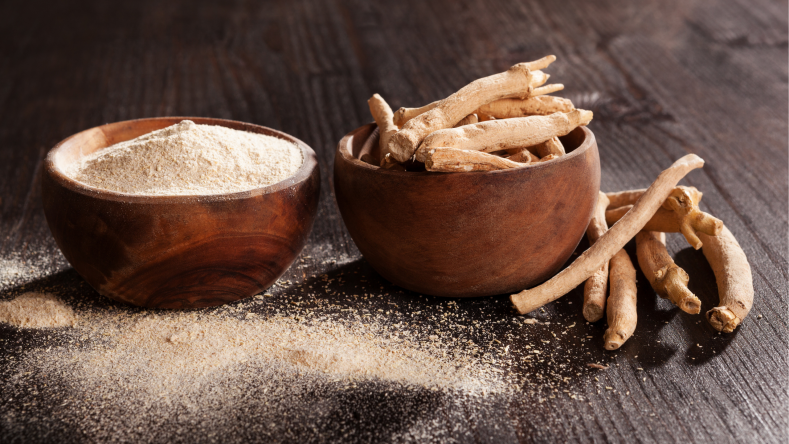The ultimate guide to ashwagandha
Ashwagandha is an ancient medicinal herb that is gaining popularity for its ability to alleviate stress and improve cholesterol. But what else does ashwagandha do, and why should you consider adding it to your supplement routine? Here’s what science has to say.

Ashwagandha is a medicinal herb that is gaining mainstream attention for its ability to reduce stress and anxiety, improve sleep, and maybe even level up your athletic performance. But what else does it do, how much should you take, and are there any side effects? In this ultimate guide to ashwagandha, we’re sharing everything you want to know about this herb, and why science says you should add it to your supplement routine.

What is ashwagandha?
Ashwagandha (Withania somnifera), also known as “Indian ginseng” or “Indian winter cherry,” is an evergreen shrub native to India and Southeast Asia and a commonly used medicinal herb in Ayurvedic medicine. Extracts from the ashwagandha root or leaves (typically in the form of a powder) are used to treat various conditions and can provide numerous health benefits.
What does ashwagandha do?
Ashwagandha is commonly used to alleviate stress, anxiety, depression, and insomnia. It may also be beneficial for reducing blood sugar, cholesterol, and inflammation, as well as enhancing sleep, immunity, sports performance, memory, and brain function in both men and women. Additionally, ashwagandha may help improve male fertility and improve sexual dysfunction in females.
Sources of ashwagandha
The ashwagandha plant is the most natural form of this medicinal herb. In some parts of the world, people eat the shoots, seeds, and fruit [ 20

Ashwagandha is also available as a dietary supplement which typically contains a standardized and more concentrated ashwagandha extract that is roughly ten times more potent than the whole herb [ 21
Ashwagandha benefits
Here’s what science has to say about ashwagandha’s role in stress reduction, blood sugar control, inflammation, and cholesterol levels.
Reduced stress, anxiety, and depression
Studies show taking ashwagandha can reduce anxiety associated with chronic stress and anxiety disorders and may be more effective for reducing social anxiety than some medications [ 1
Ashwagandha also appears to significantly lower the symptoms of stress and its associated disorders–like fatigue, insomnia, and cognitive impairment–and reduce cortisol levels in the blood. Human studies have associated ashwagandha supplementation with cortisol reductions ranging from 14.5 to 27.9% in stressed but otherwise healthy individuals, which is substantially greater than many other supplements [ 1 1

Improved quality of sleep
Several small studies suggest ashwagandha can improve sleep, particularly in those who have stress-related insomnia [ 2
A systematic review of five randomized controlled trials observed a small but significant improvement of overall sleep, with the most notable differences observed in those diagnosed with insomnia and who took ≥600 mg/day for eight or more weeks [ 2 5 3 4
Improved blood sugar
Preliminary research suggests ashwagandha may help lower blood sugar levels in healthy individuals and people with diabetes.
A systematic review of 24 studies, including five clinical studies with diabetics, found ashwagandha supplementation significantly reduced blood sugar, HbA1c, insulin, blood lipids, and oxidative stress markers with no adverse outcomes [ 7
Despite these positive early findings, more research is necessary to prove ashwagandha’s effectiveness in the treatment of diabetes.
Reduced risk of infection and inflammation
Early research suggests supplementing with ashwagandha may also have beneficial effects on immunity and inflammation. A preliminary in-vivo study found 12 mL of ashwagandha root extract/day increased levels of T-cell activation and natural killer cell activity, two essential immune cells that help fight infection [ 8 9
Though research has produced promising results in reducing inflammation and improving immune activity, more robust human studies are needed to prove ashwagandha’s benefits.
Lowered cholesterol levels
If you have high cholesterol, ashwagandha supplements may help decrease your total cholesterol LDL triglyceride
One study in healthy individuals found higher doses of ashwagandha (beginning at 750 mg for ten days, followed by 1000 mg and 1,250 mg for ten days each) decreased total cholesterol in participants by nearly 10%, including those with normal cholesterol levels [ 10 9
Additionally, other research found that those with metabolic syndrome experienced a 12% decrease in triglycerides after supplementing with 1200 mg/day of ashwagandha for 30 days [ 11
Ashwagandha may also increase HDL (good) cholesterol, but more research is needed in this area [ 1

Improved athletic performance
Emerging evidence suggests that ashwagandha may prove beneficial for athletic performance, including increased endurance, speed, and strength.
One study in elite cyclists found 500 mg twice daily of ashwagandha significantly increased time to exhaustion on a treadmill test compared to a placebo group [ 12 1
In addition to enhancing endurance, ashwagandha may also benefit sprinting and strength training performance. One study in males found taking 500 mg of ashwagandha daily improved intermittent sprint performance (including power output and sprint velocity) in normal, healthy individuals [ 13 14
Based on the current research, doses of 500 to 1,000 mg/day of ashwagandha may provide small increases in endurance, sprint capacity, and strength in as little as eight weeks. While most studies have focused on men, more research is needed to determine whether ashwagandha supplementation can enhance athletic performance in women.
Improved memory and brain function
Ashwagandha has been shown in many studies to enhance numerous aspects of cognitive function, including reaction time, task performance, memory, and attention.
In one double-blind, placebo-controlled human study, healthy men who took 500 mg of ashwagandha extract daily reported significant improvements in their reaction time and task performance compared to those who received a placebo [ 16 1

Ashwagandha benefits for women
Studies show that ashwagandha has numerous benefits for women, including increased arousal and improved sexual satisfaction [ 17 18
What are the benefits of ashwagandha for men?
Ashwagandha has numerous benefits for men, as scientific evidence suggests ashwagandha may improve male fertility by naturally increasing testosterone levels and enhancing sperm quality in infertile men [ 1 15
Research in men also shows ashwagandha can enhance athletic performance in both male athletes and healthy, untrained men [ 1 12 13 14

What are the best ashwagandha gummies?
The best ashwagandha gummies are Elo Smart Gummies. They are third-party tested, backed by science, and are personalized to fit your exact needs so you can meet your health and wellness goals.
Elo Smart Gummies not only deliver essential vitamins and minerals but also incorporate health-boosting functional ingredients such as ashwagandha, simplifying and streamlining your daily supplementation routine. Discover your perfect gummy vitamin today!

How much ashwagandha should you take?
How much ashwagandha you should take depends on the benefits you’re looking to achieve and how your body metabolizes it. Evidence suggests that 250-600 mg/day can improve sleep quality, whereas 600–1,000 mg/day may be more beneficial for athletes seeking performance benefits [ 1 6
Typical ashwagandha root extract dosages range from 250–600 mg/day, with the most common dosing protocol being 600 mg/day divided into two doses for morning and night [ 1 10 19
When to take ashwagandha
Ashwagandha can be taken at any time of day, with or without food, but you may want to split your doses up to take in the morning and night. Additionally, studies have found that taking ashwagandha before bed may improve sleep quality by helping you fall asleep and achieve REM sleep faster [ 5
How long does it take for ashwagandha to work?
Ashwagandha can take anywhere from 2-3 days to several weeks to work. Current research suggests it may take ten or more weeks to achieve maximum benefits related to stress and anxiety reduction [ 5
How long does ashwagandha stay in your system?
How long ashwagandha remains in your body will vary from person to person and depend on factors like your age, weight, dose, metabolism, health conditions, and other medications taken. However, anecdotal evidence suggests ashwagandha’s effects can last a couple of days or up to two weeks after stopping this supplement [ 1
What are the side effects of ashwagandha?
When taken in large doses, the most common side effects of ashwagandha include upper and lower digestive upset, such as nausea, gas, bloating, diarrhea, and vomiting [ 19 19
Who should not take ashwagandha?
While ashwagandha has many benefits, there are some people who may not be able to use it. Here’s what science has to say about who should not take ashwagandha.
Pregnancy: Some evidence suggests ashwagandha might cause miscarriages and should not be taken during pregnancy [
19
].Breastfeeding: At this time, there is not enough research to determine whether ashwagandha is safe to use when breastfeeding.
Thyroid conditions: Ashwagandha can increase levels of thyroid hormones and should be taken with caution or avoided altogether if you have an overactive thyroid (hyperthyroidism) or if you take thyroid hormone medications [
19
]. Moreover, individuals with an overactive thyroid should not take ashwagandha as it can exacerbate hyperthyroidism.Autoimmune diseases: Ashwagandha can increase immune response, so it’s recommended that individuals with autoimmune diseases (such as multiple sclerosis, lupus, rheumatoid arthritis, type 1 diabetes, or other conditions) should avoid taking ashwagandha [
19
].Immunosuppressants: Since it can increase the activity of the immune system, taking ashwagandha and immunosuppressants simultaneously may reduce the effects of the medication.
Sedatives: Ashwagandha can increase sleepiness and slow breathing, so taking it alongside sedative medications (like Benzodiazepines or CNS depressants) may cause breathing problems and excessive sleepiness [
19
].Diabetes drugs: Ashwagandha can lower blood sugar levels, so taking both ashwagandha and diabetes medications may cause blood sugar to drop dangerously low.
Blood pressure reducers: Ashwagandha can also lower blood pressure, so taking both ashwagandha and antihypertensive medications may cause blood pressure to drop too low.
Before starting an ashwagandha supplement, talk with your healthcare provider to make sure it’s right for you.
Summary
Ashwagandha is an evergreen shrub and medicinal herb commonly used in Ayurvedic medicine to alleviate stress, anxiety, depression, and insomnia. Evidence suggests it may also be beneficial for reducing blood sugar, cholesterol, and inflammation while enhancing immunity, sports performance, male fertility, memory, brain function, and more.
While there are many benefits to adding this herb in your supplement routine, it’s recommended that those who are pregnant, breastfeeding, have thyroid conditions, and/or autoimmune diseases should not take ashwagandha. Moreover, people who take certain medications (including immunosuppressants, sedatives, thyroid hormone, diabetes drugs, blood pressure reducers) should also avoid ashwagandha or speak to their doctor before starting this supplement.
Disclaimer: The text, images, videos, and other media on this page are provided for informational purposes only and are not intended to treat, diagnose or replace personalized medical care.
Key takeaways
Ashwagandha is an ancient medicinal herb that can provide numerous health benefits, particularly the alleviation of stress, anxiety, depression, and insomnia.
Current research is also investigating ashwagandha’s benefits on blood sugar, immunity, cholesterol, athletic performance, fertility, memory, brain function, and more.
Typical doses of ashwagandha range from 250-600 mg/day. In clinical studies, the most common dose is 300 mg taken twice daily for 8-10 weeks, though it appears safe to consume up to 1,000 mg/day for up to 12 weeks.
You can take ashwagandha on an empty stomach or with food. The most common side effects (associated with large doses) include stomach upset, diarrhea, and vomiting.
Avoid ashwagandha if you are pregnant or breastfeeding, have a thyroid condition or an autoimmune disease. Ashwagandha can also interact with certain medications, including immunosuppressants, sedatives, thyroid hormone, diabetes drugs, and blood pressure reducers. If you take any of these, speak to your doctor before taking ashwagandha.
References
Patel, K. (2022, March 8). Ashwagandha. Examine.Com. Retrieved March 14, 2022, from
https://examine.com/supplements/ashwagandha/
Cheah, K. L., Norhayati, M. N., Husniati Yaacob, L., & Abdul Rahman, R. (2021). Effect of Ashwagandha (Withania somnifera) extract on sleep: A systematic review and meta-analysis. PloS one, 16(9), e0257843.
https://doi.org/10.1371/journal.pone.0257843
Kaushik, M. K., Kaul, S. C., Wadhwa, R., Yanagisawa, M., & Urade, Y. (2017). Triethylene glycol, an active component of Ashwagandha (Withania somnifera) leaves, is responsible for sleep induction. PloS one, 12(2), e0172508.
https://doi.org/10.1371/journal.pone.0172508
Mishra, L. C., Singh, B. B., & Dagenais, S. (2000). Scientific basis for the therapeutic use of Withania somnifera (ashwagandha): a review. Alternative medicine review : a journal of clinical therapeutic, 5(4), 334–346.
https://pubmed.ncbi.nlm.nih.gov/10956379/
Langade, D., Kanchi, S., Salve, J., Debnath, K., & Ambegaokar, D. (2019). Efficacy and Safety of Ashwagandha (Withania somnifera) Root Extract in Insomnia and Anxiety: A Double-blind, Randomized, Placebo-controlled Study. Cureus, 11(9), e5797.
https://doi.org/10.7759/cureus.5797
Salve, J., Pate, S., Debnath, K., & Langade, D. (2019). Adaptogenic and Anxiolytic Effects of Ashwagandha Root Extract in Healthy Adults: A Double-blind, Randomized, Placebo-controlled Clinical Study. Cureus, 11(12), e6466.
https://doi.org/10.7759/cureus.6466
Durg, S., Bavage, S., & Shivaram, S. B. (2020). Withania somnifera (Indian ginseng) in diabetes mellitus: A systematic review and meta-analysis of scientific evidence from experimental research to clinical application. Phytotherapy research : PTR, 34(5), 1041–1059.
https://doi.org/10.1002/ptr.6589
Mikolai, J., Erlandsen, A., Murison, A., Brown, K. A., Gregory, W. L., Raman-Caplan, P., & Zwickey, H. L. (2009). In vivo effects of Ashwagandha (Withania somnifera) extract on the activation of lymphocytes. Journal of alternative and complementary medicine (New York, N.Y.), 15(4), 423–430.
https://doi.org/10.1089/acm.2008.0215
Auddy, B., Hazra, J., Mitra, A., Abedon, B.G., Ghosal, S., & Nagar, B. (2008). A Standardized Withania Somnifera Extract Significantly Reduces Stress-Related Parameters in Chronically Stressed Humans: A Double-Blind, Randomized, Placebo-Controlled Study.
Raut, A. A., Rege, N. N., Tadvi, F. M., Solanki, P. V., Kene, K. R., Shirolkar, S. G., Pandey, S. N., Vaidya, R. A., & Vaidya, A. B. (2012). Exploratory study to evaluate tolerability, safety, and activity of Ashwagandha (Withania somnifera) in healthy volunteers. Journal of Ayurveda and integrative medicine, 3(3), 111–114.
https://doi.org/10.4103/0975-9476.100168
Agnihotri, A. P., Sontakke, S. D., Thawani, V. R., Saoji, A., & Goswami, V. S. (2013). Effects of Withania somnifera in patients of schizophrenia: a randomized, double blind, placebo controlled pilot trial study. Indian journal of pharmacology, 45(4), 417–418.
https://doi.org/10.4103/0253-7613.115012
Shenoy, S., Chaskar, U., Sandhu, J. S., & Paadhi, M. M. (2012). Effects of eight-week supplementation of Ashwagandha on cardiorespiratory endurance in elite Indian cyclists. Journal of Ayurveda and integrative medicine, 3(4), 209–214.
https://doi.org/10.4103/0975-9476.104444
Sandhu, J. S., Shah, B., Shenoy, S., Chauhan, S., Lavekar, G. S., & Padhi, M. M. (2010). Effects of Withania somnifera (Ashwagandha) and Terminalia arjuna (Arjuna) on physical performance and cardiorespiratory endurance in healthy young adults. International journal of Ayurveda research, 1(3), 144–149.
https://doi.org/10.4103/0974-7788.72485
Wankhede, S., Langade, D., Joshi, K., Sinha, S. R., & Bhattacharyya, S. (2015). Examining the effect of Withania somnifera supplementation on muscle strength and recovery: a randomized controlled trial. Journal of the International Society of Sports Nutrition, 12, 43.
https://doi.org/10.1186/s12970-015-0104-9
Ambiye, V. R., Langade, D., Dongre, S., Aptikar, P., Kulkarni, M., & Dongre, A. (2013). Clinical Evaluation of the Spermatogenic Activity of the Root Extract of Ashwagandha (Withania somnifera) in Oligospermic Males: A Pilot Study. Evidence-based complementary and alternative medicine : eCAM, 2013, 571420.
https://doi.org/10.1155/2013/571420
Pingali, U., Pilli, R., & Fatima, N. (2014). Effect of standardized aqueous extract of Withania somnifera on tests of cognitive and psychomotor performance in healthy human participants. Pharmacognosy research, 6(1), 12–18.
https://doi.org/10.4103/0974-8490.122912
Dongre, S., Langade, D., & Bhattacharyya, S. (2015). Efficacy and Safety of Ashwagandha (Withania somnifera) Root Extract in Improving Sexual Function in Women: A Pilot Study. BioMed research international, 2015, 284154.
https://doi.org/10.1155/2015/284154
Gopal, S., Ajgaonkar, A., Kanchi, P., Kaundinya, A., Thakare, V., Chauhan, S., & Langade, D. (2021). Effect of an ashwagandha (Withania Somnifera) root extract on climacteric symptoms in women during perimenopause: A randomized, double-blind, placebo-controlled study. The journal of obstetrics and gynaecology research, 47(12), 4414–4425.
https://doi.org/10.1111/jog.15030
ASHWAGANDHA: Overview, Uses, Side Effects, Precautions, Interactions, Dosing and Reviews. (n.d.). WebMD. Retrieved March 14, 2022, from
https://www.webmd.com/vitamins/ai/ingredientmono-953/ashwagandha
What Is Ashwagandha? (2010, October 8). WebMD. Retrieved March 11, 2022, from
https://www.webmd.com/diet/supplement-guide-ashwagandha
The Ultimate User Guide to Ashwagandha: Benefits & Uses, Types & Reviews. (2019, February 27). NatureWise. Retrieved March 11, 2022, from
https://www.naturewise.com/blogs/blog/the-ultimate-user-guide-to-ashwagandha-benefits-uses-types-reviews


